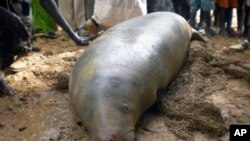Conservationists in West Africa are working with local fishermen to protect endangered African manatees, which are an important part of both the environment and local folk lore.
The distinctive sound can be heard of a manatee - a torpedo-shaped marine animal that lives in the Caribbean, South America and along the coast, rivers and wetlands of over 20 African countries.
While very little is known about the numbers of African manatees, they are the most threatened. Some fishing communities hunt them for meat, hides and bones.
Elusive creatures
That has put the African manatee on the United Nations red list of endangered species. Lucy Keith Diagne, a scientist with the American-based EcoHealth Alliance, has been tracking manatees for more than 10 years.
"In Africa, they are the least-studied large animal," said Diagne. "I think part of that is they are very mysterious. They live in murky water and extremely remote places. Most people see them dead or in a stew-pot, unfortunately."
Manatees migrate and are generally shy, solitary creatures. They also are slow breeders. They mate about every two years and have only one calf at a time.
Their rare sightings have, in part, made the manatees something of an enigma. Among some fishing communities, they are even creatures to be feared.
Mystical animal
El Ali Haida is director at l'Oceanium, an environmental non-profit group based in Dakar. Haida said the manatee is a very mystical animal. In the villages of Casamance, the hunters must wear many different talismans and perform a ritual that can last up to two hours before they even dare to hunt the manatee.
Diagne said the spirit that supposedly lives in the manatee is called Mamiwata.
"I find it fascinating that in many different cultures the manatee is always a mermaid. Here in Africa, mamiwata means lots of different things, in lots of different countries. In Gabon, it is a beautiful young woman who pulls men underneath the water and takes them to her lair - never lets them free. Basically, I think it is an explanation for fishermen who drown - they just never come home to their families," said Diagne.
"In Nigeria, mamiwata is a very positive thing. If she takes you to her lair and then she releases you later, then your family will be prosperous for life. Totally different end of the perspective, mamiwata is another name for prostitute in Cameroon," said Diagne. "There are very few places, though, where the legend translates to the real animal in the sense that people respect it enough not to kill it."
Financial gain
For those who actively hunt the manatee, Haida said the financial benefits can be huge. The meat from one manatee can weigh as much as 500 kilograms. When sold at market for $2 per kilogram that is a lot of money in a poor country like Senegal.
The manatees are protected by national laws in every country where they are found. And yet, the lack of enforcement and education means the numbers of manatees are still believed to be decreasing.
Momar Sow oversees a manatee conservation project across six West African countries with the non-profit group Wetlands.
"Fortunately, in Senegal, Gambia and Guinea, they have a traditional respect for these species," said Sow. "It is very rare to find young hunters. Most of them are old. There has been a degradation of traditional rules given to young boys. This is a luck for us. They didn't disseminate the tradition of how to kill manatee."
Protecting biodiversity
Bienvenue Sambo is a professor and researcher at the Institute for Science and the Environment at Cheikh Anta Diop University in Dakar. He said African manatees are an important part of biodiversity.
If the manatees are lost, Sambo said there will be a gap in the ecosystem. We don't know the virtues of every species, he said, so if we want to keep ourselves in the realm of sustainability, we need to protect them.
In the developing world, Sambo said, it is hard to convince someone who does not have enough to eat that they should help preserve a species for future generations.
L'Oceanium is protecting 22 manatees in the southern Casamance region, and is working with other communities to build ecotourism sights where tourists pay to see manatees in the wild.
Haida said if the environment allows people to make money, then they will have incentive to protect their environment.




